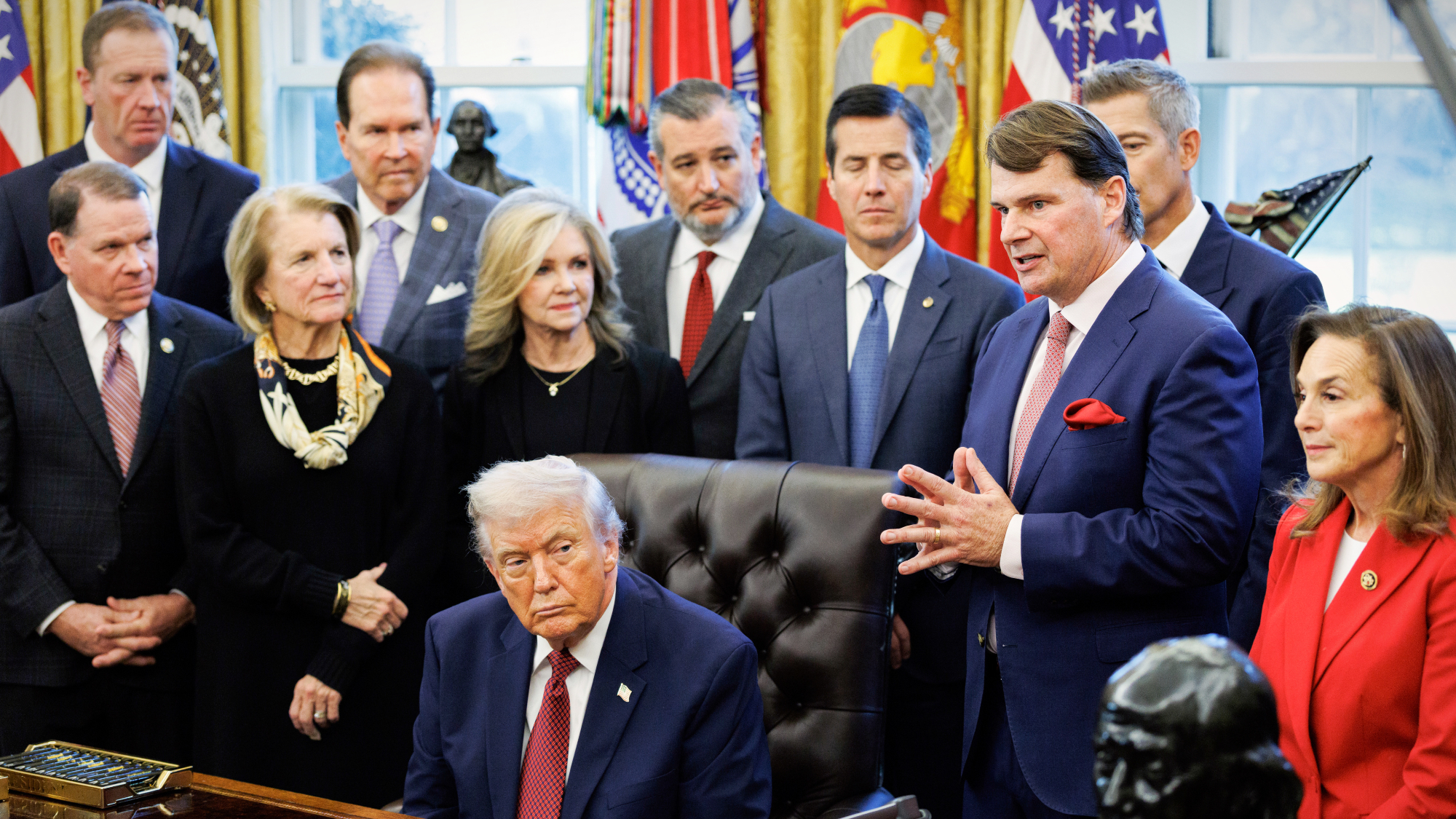Singular or plural? It's complicated.
Welcome to the weird world of quantity words!


There is a myriad of ways we can express quantities in English, but there are just a couple words that are much in dispute.
Wait. Should that be "there are myriad ways" and "just a couple of words"?
Those are the two words much in dispute: myriad and couple. But we ought to just relax and let them go. They're only sliding down the same slope as many words have before them, and still more might after them: the slippery slope from noun to quantifier.
The Week
Escape your echo chamber. Get the facts behind the news, plus analysis from multiple perspectives.

Sign up for The Week's Free Newsletters
From our morning news briefing to a weekly Good News Newsletter, get the best of The Week delivered directly to your inbox.
From our morning news briefing to a weekly Good News Newsletter, get the best of The Week delivered directly to your inbox.
What's a quantifier? It's a kind of word not everyone knows exists. Many people — including some who write usage guides and dictionaries — think there are nouns, and there are adjectives, and everything that modifies a noun is an adjective. It's tidy, but it's not true, and it leads to some silly mistakes.
First of all, numbers aren't adjectives. They're not! We know this because they don't behave exactly like adjectives. For example, I can say "soft red pillows" and "the pillows are soft and red," but if I say "three soft red pillows," I can't say "the pillows are three, soft, and red" — and I most certainly can't say "the pillows are very three" even though I can say they are "very soft and red." Also, I can say "a pink balloon" but I can't say "a one balloon." (After all, a comes from one.)
But not all words that express quantities are numbers. Even some numbers aren't like other numbers. Consider: I can say "a thousand balloons," "a few thousand balloons," and "many thousands of balloons," but I wouldn't say "a nine balloons," "a few nine balloons," or "many nines of balloons" (unless I meant many nine-packs, in which case nine has become a noun standing for "nine-pack").
That's because thousand started out as a noun and, a long time ago, slid down the slope to becoming a quantifier. So did hundred. So did dozen. And that's the slope that couple and myriad are on right now.
A free daily email with the biggest news stories of the day – and the best features from TheWeek.com
When these words were nouns, they behaved like nouns, pluralizing, taking a singular verb when single, and needing an of to attach them to another noun. That's right: "a thousand of cattle," "two millions of pounds," "several dozens of eggs." We still sometimes use dozen like this when referring to cartons. These quantifiers still show the marks of their noun past: "There were a hundred cats," not "there were hundred cats" (compare "there were nine cats"); "thousands of dogs" and "scores of years" but not "fifties of dogs" or "nines of years." Quantifiers that were once nouns can still be used at least sometimes as nouns (depending in part on how far down the slope they've slid). But the rest of the time they're not behaving like nouns — but not like adjectives either.
Take couple. There are other nouns that mean "two": pair and brace, for instance — "I got a pair of tickets"; "I shot a brace of pheasants." But they haven't become quantifiers (except in some less dominant versions of English; you may have heard someone say "I bought a pair shoes"). According to some people, neither has couple. They know it as a noun and they want it to stay a noun. Some usage guides will tell you that using a couple without of is colloquial. For many people it is. But since it first started being used that way in the U.S. in the late 1800s, it has spread, following the path of dozen and all the others. It's regularly being used without of in literary fiction and even on occasion in academic journals. You can keep using a couple of if you want; the of is unlikely to disappear entirely in our lifetimes. But you may as well get used to seeing "a couple days," "a couple years," and so on.
Oh — and as to the use of a couple to mean "two or three or four," that's a separate matter, but you're not going to win on that one either. Imprecision is something that can come with becoming a quantifier. We tend to use other quantifiers loosely too: "I can give you a hundred reasons" may not mean one more than 99 and one less than 101; "I've been there a dozen times" could mean 13 or 11 or perhaps even eight, depending on the context and the speaker. And myriad can mean just "countlessly many."
Myriad is not nearly as common a word as couple, but it has more ways it can be used. I won't say there are myriad ways you can use it, or a myriad ways you can use it, or even a myriad of ways you can use it — or that there is a myriad of ways — but there are at least those four ways. It started as a noun, of course, meaning "group of 10,000," borrowed from Greek by way of Latin. It arrived in English in the 1500s, and by the 1600s it was already being used on occasion as a quantifier, both with and without a. It slipped down the slope quickly, no doubt at least in part because of its magnitude — when many just isn't big enough, myriad serves nicely. But it's stayed in use at all the stages of the slope: "a myriad of ways is," "a myriad of ways are," "a myriad ways are," "myriad ways are." Since it's been used all these ways for centuries, there's no reason not to keep using it however we want, choosing according to what works best in the context.
Along with the quantifiers that mean specific numbers (and are used sometimes exactly, sometimes approximately), there are also quite a lot of indefinite quantifiers: ones that convey a general but never exact sense of quantity — a lot, a bunch, a good number, a large percentage, and so on. They have made it to the first level of the slope, taking a plural verb, but generally haven't made it to the second level, dropping the of. Like other quantifiers that came from nouns, these indefinite quantifiers can still be used as nouns, too, and that confuses people sometimes.
We don't normally have trouble distinguishing between the two senses of a lot: "a lot of people were arriving, so we directed them to a lot that was halfway down the block." We can usually tell the difference between "a bunch of flowers are on the table" (meaning there are many flowers on the table) and "a bunch of flowers is on the table" (meaning the flowers are tied together in a bunch).
When we come to quantifiers such as a large number and a significant percentage and the majority, however, some of us look at them too long and think, "These aren't adjectives, so they're nouns, and they're singular nouns, so they have to take a singular verb." But they don't have to; as with a bunch, it depends on what you're referring to. If you mean the fact of having a majority lets your group win, you say "A majority wins," but if you mean that more than 50 percent of the individuals win (for instance in a poorly run game), you say "A majority win." If you're trying to do quantitative research and your data isn't coming together, you can say "A significant percentage is hard to reach"; if you're attempting to contact people and many of them are in remote locations, you can say "A significant percentage are hard to reach" because you're referring to the people and not the number itself. And if you're expecting many guests at your costume party, you may say "A large number are coming"; if you're expecting someone dressed up as the annual national debt figure, you can say "A large number is coming."
There's a lot more that can be said about quantifiers — I haven't even talked about mass objects as opposed to count nouns ("A lot of water is pouring out of the building, and a lot of people are running away") — but this much is plenty to start with. The most important point is that they're not adjectives but they're not really nouns anymore either (except when being used exactly as nouns are used). While people who tell you how to use them may not make that distinction, linguists have known about it for decades. The renowned linguist Ray Jackendoff wrote a seminal paper about quantifiers in 1968, and linguists have been refining the details further ever since. And now you know a bit of it too — more than a couple things, but not a myriad.
James Harbeck is a professional word taster and sentence sommelier (an editor trained in linguistics). He is the author of the blog Sesquiotica and the book Songs of Love and Grammar.
-
 Trump boosts gas cars in fuel economy rollback
Trump boosts gas cars in fuel economy rollbackspeed read Watering down fuel efficiency standards is another blow to former President Biden’s effort to boost electric vehicles
-
 Hegseth’s Signal chat put troops in peril, probe finds
Hegseth’s Signal chat put troops in peril, probe findsSpeed Read The defense secretary risked the lives of military personnel and violated Pentagon rules, says new report
-
 Texas is trying to become America’s next financial hub
Texas is trying to become America’s next financial hubIn the Spotlight The Lone Star State could soon have three major stock exchanges
